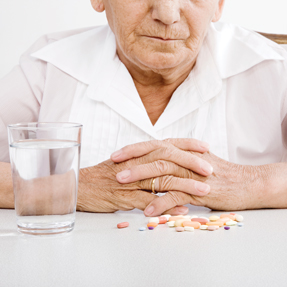A few tips can improve older patients' memory
Most complaints of memory problems aren't related to cognitive impairments, and as such they can be alleviated with a few simple tips.
Does your patient remember where his or her car keys are? Do you remember where yours are?
Don't worry. Even if the answer to both questions is no, chances are neither of you has cognitive impairment. Even better, there are evidence-based strategies that can make it easier to retain the location of your keys and other useful memories.

Thomas C. Rosenthal, MD, chair of the department of family medicine at the University of Buffalo, described some of these tricks of the trade at the annual meeting of the American Academy of Family Physicians, held in Philadelphia in October.
First, he reassured his audience that most complaints they hear about memory are not indicative of cognitive problems. “Only 34% of patients who complain have cognitive impairment at the time of the complaint,” he said.
To separate those impaired patients from the 66% with normal memory issues, Dr. Rosenthal recommends the clock test. Patients with impairment will have difficulty drawing a clock that shows a time of 2:45. Unimpaired patients, even those with depression, will draw the clock without a problem.
Make sure to consider depression as a possible cause of memory complaints. “One of the first things to think about is, ‘Is this patient depressed?’” said Dr. Rosenthal. Obviously, if the answer's yes, treat the depression.
For the healthy remainder, an internist can offer advice on how to improve memory or work around its decline. Patients may be reluctant at first. “A patient says, ‘I used to be able to remember that without having to resort to these games,’” said Dr. Rosenthal.
Reassure patients that memory techniques are a healthy compensation for aging and can possibly even bring their memorizing skills back to what they once were. Dr. Rosenthal described studies that rewarded elderly people and college students for succeeding at memory-related tasks.
“When there's a payoff to remembering something, they perform equally well to younger adults,” he said. “The elderly did need some more reminders to focus, to pay attention, to rehearse. They tend to be more easily distracted.”
People can give these reminders to themselves if they learn to make it a habit. For some, verbal reminders will work best, for example, saying aloud where you're putting the car keys, while others encode the information better with visual cues, such as concentrating on the scene when they set down the keys.
“You can help a patient just by understanding what their preferences are,” said Dr. Rosenthal. Usually people who read or write a lot will prefer the verbal system, while artistic types will get the best results from visualization.
But for either group, the most effective way to remember something is to write it down. Use of a diary—a daily, structured reflection—has been shown to improve memory, and less formal notes are helpful, too, according to Dr. Rosenthal. “Writing it down is the single most effective memory strategy,” he said. “Carrying around a little notebook can dramatically improve function.”
A more animate companion can also help elderly patients who are concerned about memory. “I strongly suggest they take a friend or family member with them to their doctor visits, shopping, to the bank. They gain confidence, they gain social interaction,” Dr. Rosenthal said.
Loneliness almost doubles the risk of memory problems, and social activities have been shown to improve cognitive function and memory. Dr. Rosenthal encourages his patients to be social and active (better exercise tolerance has been associated with better cognitive ability, too): gardening, volunteering, exercising outside, or spending time with family, friends or pets.
One leisure-time activity has been shown to particularly improve cognitive function: computer games. There are games specifically designed to provide cognitive training, but any kind of game that challenges the brain appears to be beneficial.
“The effects persist as long as five years,” said Dr. Rosenthal. “It seems like you've got to do it about an hour a day five days a week.”
It might be best not to do that game-training on your smartphone, though, since research has shown that multitasking is associated with worse recall. “Just mentioning this to people can help them a great deal,” Dr. Rosenthal said. “Multitasking is inherent in our society right now.”
Also inherent in modern, geriatric society is the use of medications, which can have effects on memory. Many of the “anti” drugs—antihistamines, antidepressants, antipsychotics—have been shown to diminish attention, memory and recall. The anticholinesterase inhibitors were thought until recently to promise the opposite. “They've been a disappointment,” said Dr. Rosenthal. “They don't prevent decline. They may delay it a little.”
Good medical management of chronic conditions can lower the risk of cognitive loss. Statins for hypercholesteremia and pulmonary rehab for chronic obstructive pulmonary disease have both been associated with better cognitive ability. Blood pressure control helps prevent dementia, with the caveat that diastolic blood pressure below 65 mm Hg is associated with memory declines. “You might have to accept higher systolic levels to keep the diastolic above 65,” said Dr. Rosenthal, noting that this threshold has been recommended by National Heart, Lung and Blood Institute.
When patients report memory problems, it's also worthwhile to assess their nutrition status, especially B vitamins and protein. Older patients sometimes end up limiting their diet to what is convenient. More balanced eating and supplements can help their cognitive function.
Perhaps more surprisingly, some light drinking turns out to be associated with less memory trouble. People who consumed about one drink a day were half as likely to develop memory problems as both non-drinkers and heavier drinkers. If you're reporting this to patients, make sure they understand how big a drink is, noted Dr. Rosenthal. “You have to talk about glass size, but you don't have to discourage people who enjoy a shot of Scotch a day or a glass of wine,” he said. (For more on talking to patients about alcohol, see the article “Taking a drink: what patients should know.”)
A calming drink, some reassurance, and these tips might be all that worried patients need. “The vast majority of patients we see who are concerned about their memory will do just fine with this level of instruction,” concluded Dr. Rosenthal.





